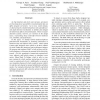Free Online Productivity Tools
i2Speak
i2Symbol
i2OCR
iTex2Img
iWeb2Print
iWeb2Shot
i2Type
iPdf2Split
iPdf2Merge
i2Bopomofo
i2Arabic
i2Style
i2Image
i2PDF
iLatex2Rtf
Sci2ools
ISCA
2005
IEEE
2005
IEEE
Design and Evaluation of Hybrid Fault-Detection Systems
As chip densities and clock rates increase, processors are becoming more susceptible to transient faults that can affect program correctness. Up to now, system designers have primarily considered hardware-only and softwareonly fault-detection mechanisms to identify and mitigate the deleterious effects of transient faults. These two faultdetection systems, however, are extremes in the design space, representing sharp trade-offs between hardware cost, reliability, and performance. In this paper, we identify hybrid hardware/software fault-detection mechanisms as promising alternatives to hardware-only and software-only systems. These hybrid systems offer designers more options to fit their reliability needs within their hardware and performance budgets. We propose and evaluate CRAFT, a suite of three such hybrid techniques, to illustrate the potential of the hybrid approach. For fair, quantitative comparisons among hardware, software, and hybrid systems, we introduce a new metric, Mean ...
| Added | 25 Jun 2010 |
| Updated | 25 Jun 2010 |
| Type | Conference |
| Year | 2005 |
| Where | ISCA |
| Authors | George A. Reis, Jonathan Chang, Neil Vachharajani, Ram Rangan, David I. August, Shubhendu S. Mukherjee |
Comments (0)

